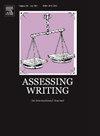执行功能、来源使用与综合写作表现之间的关系
IF 4.2
1区 文学
Q1 EDUCATION & EDUCATIONAL RESEARCH
引用次数: 0
摘要
对写作的准确评价依赖于对其潜在过程和相关因素的透彻理解。虽然综合写作对学生的学业成功和未来的职业发展至关重要,但在如此复杂的任务中影响表现的因素仍有待科学研究。尤其值得一提的是,虽然出处使用在完成新闻写作任务中的核心作用已得到广泛认可,但我们仍然需要探索能够促进作者有效使用出处的因素。虽然最近的研究强调了执行功能(EFs)的关键作用,如工作记忆、抑制和认知灵活性,在写作活动中,这些基本的认知技能对来源使用和IW表现的确切影响尚不清楚。为此,本研究招募了233名香港中学生完成一套标准化的EF任务和一项中文读写任务。分析学生的书面作品,内容思想的使用和基于源材料的语言转换。我们发现视觉空间工作记忆对IW表现有显著的直接影响。来源使用的两个关键方面——来自来源的想法和接近复制——介导了英语学习技能和IW绩效之间的关系。这些发现有助于我们理解EF技能在复杂IW任务中的作用。我们强调了我们的结果对综合写作的评估、教学和学习的影响。本文章由计算机程序翻译,如有差异,请以英文原文为准。
The relationship between executive functions, source use, and integrated writing performance
An accurate assessment of writing relies on a thorough understanding of its underlying processes and related factors. While integrated writing (IW) is crucial for students’ academic success and future career development, the factors influencing performance in such complex tasks remain under scientific investigation. In particular, although the core role of source use in completing IW tasks is widely acknowledged, we still need to explore factors that could facilitate writers’ effective use of sources. While recent studies have highlighted the critical role of executive functions (EFs)—such as working memory, inhibition, and cognitive flexibility—during writing activities, the exact influence of these foundational cognitive skills on source use and IW performance remains unclear. To this end, this study recruited 233 secondary students in Hong Kong to complete a set of standardized EF tasks and a Chinese reading-to-write IW task. The students’ written products were analyzed regarding the use of content ideas and linguistic transformation based on source materials. We found that visual-spatial working memory had a significant direct effect on IW performance. Two critical aspects of source use—ideas from sources and near copy—mediated the relationship between EF skills and IW performance. These findings contribute to our understanding of the role of EF skills in complex IW tasks. We highlight the implications of our results for the assessment, teaching, and learning of integrated writing.
求助全文
通过发布文献求助,成功后即可免费获取论文全文。
去求助
来源期刊

Assessing Writing
Multiple-
CiteScore
6.00
自引率
17.90%
发文量
67
期刊介绍:
Assessing Writing is a refereed international journal providing a forum for ideas, research and practice on the assessment of written language. Assessing Writing publishes articles, book reviews, conference reports, and academic exchanges concerning writing assessments of all kinds, including traditional (direct and standardised forms of) testing of writing, alternative performance assessments (such as portfolios), workplace sampling and classroom assessment. The journal focuses on all stages of the writing assessment process, including needs evaluation, assessment creation, implementation, and validation, and test development.
 求助内容:
求助内容: 应助结果提醒方式:
应助结果提醒方式:


